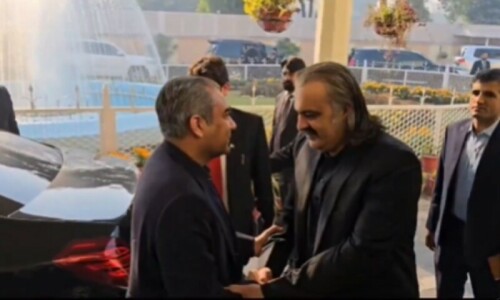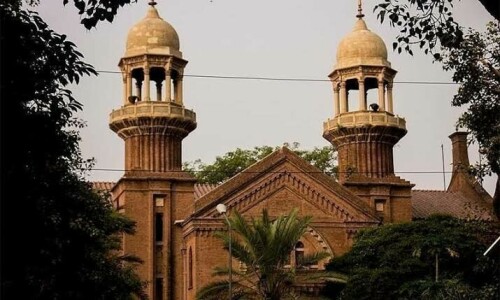ISLAMABAD: Chief Justice Mian Saqib Nisar on Wednesday said that safeguarding cardiac patients from spurious or substandard stents was the real motive behind the suo motu notice taken by the Supreme Court in the matter.
Instead of creating panic in society, the chief justice observed, the objective of the notice was to protect the interest of patients being fleeced by the widespread practice of getting medical devices at exorbitant prices.
The court had taken the notice on reports that some public health institutions such as the cardiac ward of Mayo Hospital Lahore and some other government-run hospitals in Punjab were either implanting stents into patients even when the intrusive procedure was simply not required or if the same was needed, the patients were charged exorbitantly — up to Rs180,000 per stent.
FIA reports illegal sale of unregistered devices at Mayo hospital
“We are not going to take half-hearted measures but the purpose is to facilitate the patients by bringing improvement in the system since the treatment of heart ailments is very expensive,” said the chief justice who heads the three-judge bench.
Besides, the apex court cautioned the media against creating panic among patients through debates and expert opinions presented on TV channels and warned that the court might consider issuing orders to prevent media from instilling fear in society.
The hearing coincided with Tuesday night’s medical emergency when one of the SC judges developed some cardiac ailment and was rushed to hospital.
In compliance with orders issued during the last hearing, Additional Attorney General (AAG) Muhammad Waqar Rana presented a comprehensive report on behalf of the Federal Investigative Agency (FIA) on the widespread practice of implanting stents into patients. He argued that easy availability of good quality and registered stents at affordable prices would help check accessibility to unregistered ones.
The AAG said that stents of 68 qualities had been registered by the Drugs Regulatory Authority of Pakistan (Drap) and explained that three categories of stents were available in the market. First being the one made of stainless steel or chromium plated devices, the second being drug eluted or medically coated stents, and the third being the bio-absorb stents — the latest technology which the Food and Drugs Administration of the US approved last year.
He brought to the court’s attention a stay order granted by the Sindh High Court to some drugs importers.
Drap chief Dr Mohammad Aslam told the court that his organisation was seized with 37 applications for stent registration, adding that 13 out of total 68 approved stents had been registered recently.
Advocate Ali Raza representing the Pakistan Society of Interventional Cardiology said that cardiologists sometimes felt handicapped because not only the stents but pacemakers and allied components used during angioplasty or for implanting the stents like catheter or ballooning had not been registered.
The court ordered the health ministry and Drap to hold meetings of all stakeholders on a war footing to register the quality medical devices and submit a comprehensive report by Tuesday. Drap will also file a list of the pending cases of registration of stents and other devices.
FIA surprise check
In its report, the FIA said that one of its teams raided Mayo hospital and found Messrs Pak Punjab Caredex Medical System and Messrs Saving Life Technology involved in selling stents in an illegal manner at a lab of the hospital in connivance with the head of the cardiac ward.
The record showed, according to the FIA, that 91 stents each of the two companies had been implanted into the patients from October 2016 to January 12, 2017 through self-purchase of patients.
These stents were sold by private persons in an illegal manner at the hospital’s cath lab and during the verification from Drap the stents recovered from the custody of the salesman bearing brand `DESyne’ (Ireland) and`eucatech’ (Germany) were found to be unregistered, the FIA stated.
Illegal sale of blood
In a separate suo motu case, Dr Mohammad Arshad Rana informed the court about the illegal sale of blood to patients. He said the blood had been donated by volunteers to the blood bank of Federal Government Services Hospital, popularly known as Polyclinic Hospital Islamabad.
The court had taken up the case after allegations of misappropriation in the supply of medicines and oxygen and nitrogen gases to patients at the polyclinic Hospital surfaced.
Dr Waqar Aftab, appearing pro bono publico, told the court that the liver transplant centre at the Pakistan Institute of Medical Sciences, Islamabad, with an annual budget of over Rs422 million, had so far conducted only one transplant since its inception and that patient too could not survive. Likewise, he said, nothing significant was going on in Pims’ other special section called Breast Cancer Screening Centre with the yearly budget of Rs200m. He said that salaries of Pims staff were paid by the federal government and all the equipment installed there had also been provided by the government, yet the patients, other than the federal government employees or those deserving zakat, had to pay for the treatment. The diagnostic centre of the hospital remained functional from 8am till 2pm while all the private diagnostic centres around the public hospital worked 24 hours a day.
The court observed that it may consider ordering forensic auditing of the projects and directed the authorities to submit details of the diagnostic facilities of the public hospitals of Islamabad and their status.
Published in Dawn, February 2nd, 2017












































